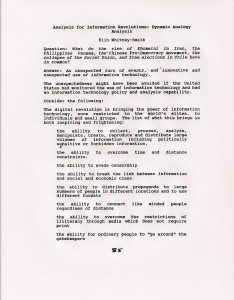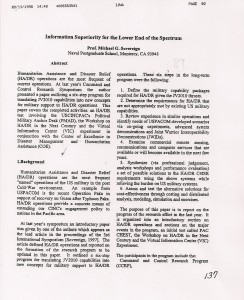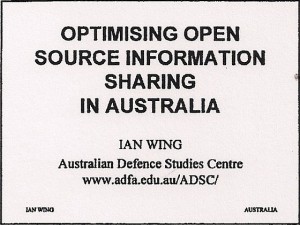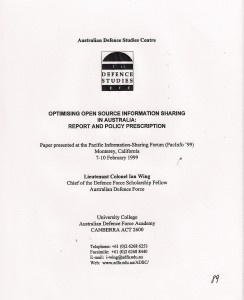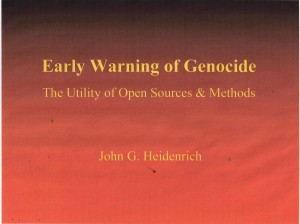
1999 Sovereign (US) Information Superiority for the Lower End of the Spectrum (Humanitarian Assistance and Disaster Relief)
Historic Contributions, Peace Intelligence1999 Wing (AU) Optimising Open Source Information Sharing in Australia
Communities of Practice, Historic Contributions, Peace Intelligence1997 Tyrrell (UK) Proposals for the Development of an Open Source Programme to Support NATO and PfP Activities
Historic Contributions, Military, Non-Governmental, Peace Intelligence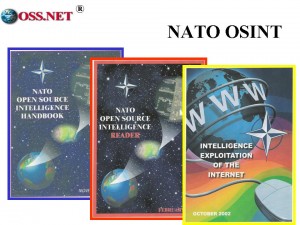
Without the leadership of then Capt Patrick Tyrrell, RN OBE, these handbooks would not exist today. He started the ball rolling, BGen Jim Cox, CA, then NATO and SHAPE Deputy J-2 organized a lecture to all the flag officers in charge of military intelligence, and finally directed SACLANT, then led by General William Kernan, USA, to create these first multinational doctrinal guides. Under the direct supervision of Admiral Sir William Pewone, RN, this was done over the course of two years. Below is the white paper and lecture that started it all.
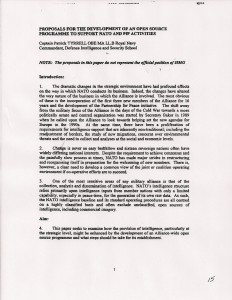
1996 Information Peacekeeping: Innovative Policy Options
Briefings & Lectures, Communities of Practice, Peace Intelligence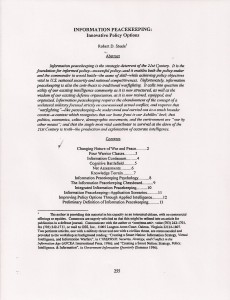
This was a very original piece of work and a major step forward in the thinking on this topic. It would lead to a publication for the U.S. Institute of Peace in 1997. It is appropriate at this juncture to credit Dr. Professor Doug Dearth, long-time course coordinator for the National Senior Intelligence Officers Course at the Joint Military Intelligence Training College, and Col Al Campen, USAF (Ret), the father of DoD C4I as a concept, and long-time publisher for the Armed Forces Communications and Electronics Association (AFCEA). Alone among thousands, these two officers recognized the value of this thinking, and pressed for finished work in the form of articles and chapters, and then books. Their three books on CYBERWAR were a gift to national policy-makers that has never been properly acknowledged.
1993 Greenwald (US) The Unrepresented Nations and Peoples Organization: Diplomacy’s Cutting Edge
Historic Contributions, Peace Intelligence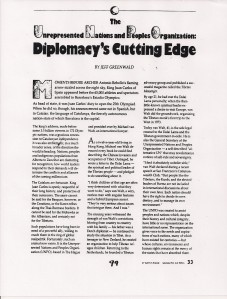
The matter of unrepresented peoples and nations, the voices not heard, may prove to be the single most important element to be addressed by 21st Century Intelligence.
We now know that prior to the arrival of Columbus in 1492, the indigenous peoples of the Americas had devised a breadth and depth of knowledge that was destroyed by European deseases and predatory invasions.
We now know that the voices of gender, of poverty, of minority, when not heard, cost society diversity of persception and feeling.
With the arrival of the Internet, and of the Nokie cell phone that does not need to be charged (it recharges with ambient energy), the people are, as Howard Zinn has anticipated, “a power government cannot suppress. ” We live in an “unconquerable world” as Jonathan Schell writes so ably.
Richard Falk, among others, is to be recognized for the pioneering work in the 1970's on the need for assemblies of peoples and of religions. Similarly, Philipp Allott, in “Health of Nations,” addresses the cosmic damages of the Treaty of Westphalia. As this is being written, Africa may be emerging as a continent finally able to create an African by, of, and for Africans.
Human Intelligence–all humans, all minds, all the time–NOT technical intelligence–is the future.
1993 Whitney-Smith Toward An Epistemology of Peace
Historic Contributions, Peace Intelligence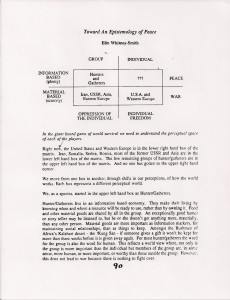
We've lost touch with this visionary, but our current work on datqa pathologies and information asymmetries bear out the view of Gandhi and so many others–there is plenty for all, but war is a racket, banks are legalized theft, and most governments are corrupt at all levels for lack of visionary ethical informed leaders as well as informed citizens devoted to preserving the commons for all.
Below is a second document that she provided for OSS ‘1993.
